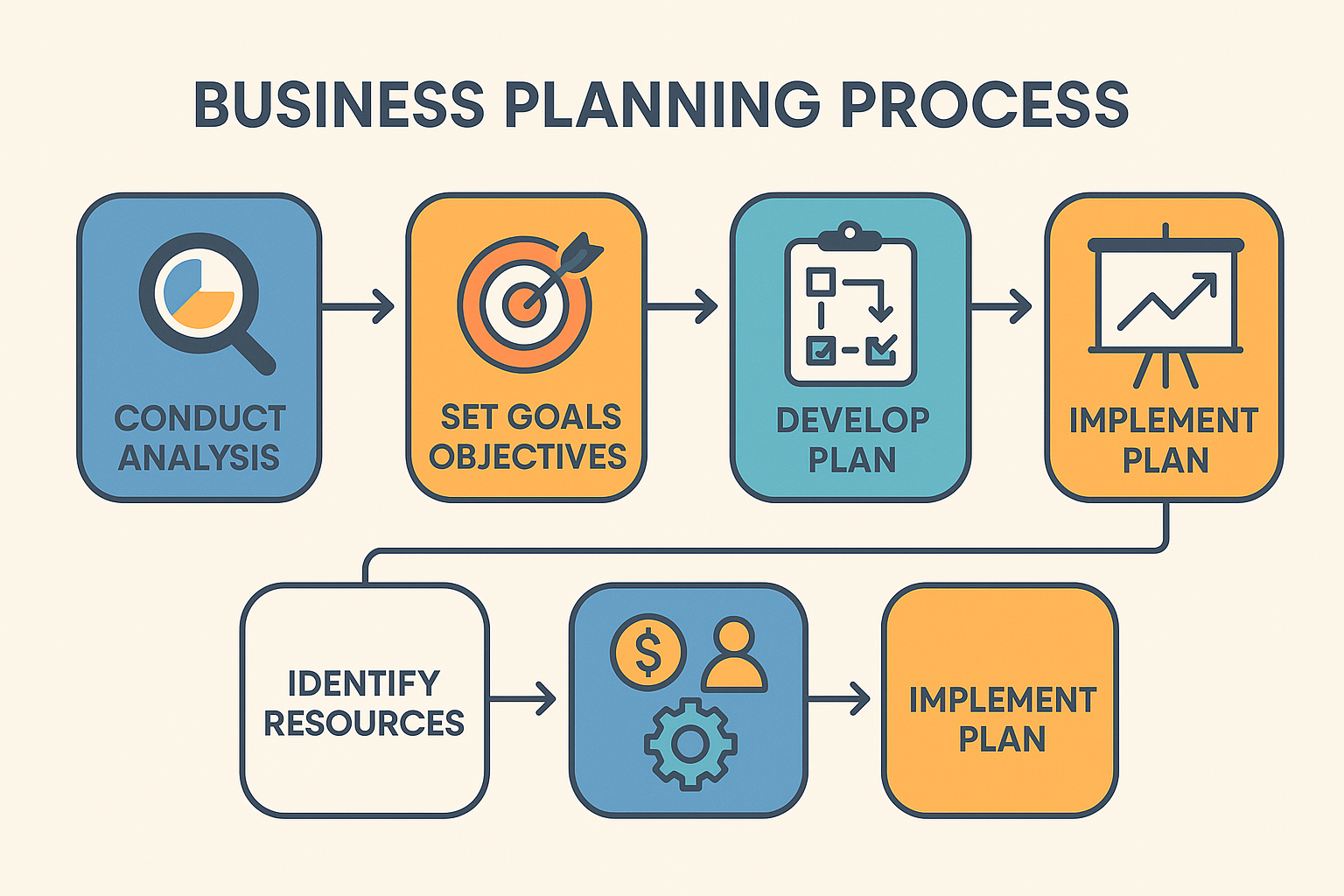A business planning process is a systematic approach to defining a company’s direction and making decisions on allocating its resources to pursue this direction. It involves evaluating the current state of the business, setting goals and objectives, and identifying the resources and actions needed to achieve them.
This process helps businesses to stay organized and focused on achieving their goals and can be used to identify potential challenges and opportunities.
The Steps in the Business Planning Process
By regularly revisiting and updating the business plan, companies can stay flexible and adapt to changing circumstances, helping them to remain competitive and successful in a dynamic business environment.
The following are some steps in the business planning process:
- Conduct a thorough analysis of the current state of the business, including its strengths, weaknesses, opportunities, and threats. This is known as a SWOT analysis.
- Set clear and specific goals and objectives for the business, taking into account its current situation and the opportunities and challenges identified in the SWOT analysis.
- Develop a comprehensive plan for achieving the goals and objectives, including a timeline, budget, and action steps.
- Identify the resources needed to implement the plan, including financial resources, human resources, equipment and technology, and any other assets that may be required.
- Implement the plan and monitor its progress, adjusting as needed to ensure that the business stays on track to achieve its goals and objectives.
- A key part of the business planning process is the business plan presentation. This is the opportunity for the business owner or management team to present their plan to potential investors or lenders, and to persuade them to invest in the business or provide financing. A successful business plan presentation should be well-organized, informative, and persuasive, and should effectively communicate the key points and unique selling points of the business.
Business experts like Global Resources Reviews advice that to nail the business plan presentation, it’s important to carefully prepare and practice beforehand. This means reviewing the business plan in detail, rehearsing the presentation, and anticipating potential questions and concerns from the audience. It’s also a good idea to use visual aids, such as slides or diagrams, to help illustrate key points and make the presentation more engaging.
During the presentation, it’s important to speak confidently, clearly, and concisely, and to use storytelling techniques to capture the audience’s attention and keep them engaged.
Benefits of the Business Planning Process
There are several key benefits to following a structured business planning process, including:
- A clear sense of direction and purpose for the business can help to motivate employees and keep everyone focused on the same goals.
- Improved decision-making, as the planning process helps to identify the potential risks and opportunities associated with different courses of action.
- Better allocation of resources, as the business plan provides a blueprint for how to use the company’s resources in the most effective way to achieve its goals.
- Increased chances of success, as the planning process helps businesses to identify potential challenges and develop strategies to overcome them.
- The business planning process can also help to improve communication and collaboration within the company, as it provides a common framework for discussing and aligning goals and objectives.
- The process can also be used to develop contingency plans for dealing with unexpected events or challenges, such as changes in the market or shifts in customer demand.
Conclusion
A business planning process is an essential tool for businesses of all sizes and industries, as it helps to ensure that the company is focused on achieving its goals and making the most of its resources. So, it is a very important process for the success of a business.
In addition to the internal benefits, the business planning process can also be useful for communicating the company’s direction and goals to external stakeholders, such as investors, customers, and partners.
A well-written and comprehensive business plan can also serve as a valuable tool for securing financing and attracting investors, as it provides a clear and persuasive argument for why the business is worth supporting.


0 Comments